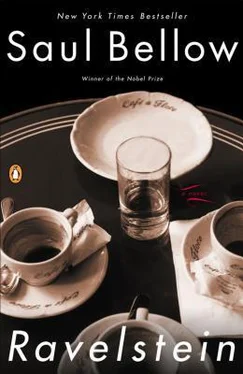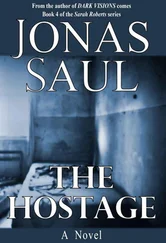Although I was Ravelstein's senior by a good many years, we were close friends. There were sophomoric elements in my character as there were in his, and these leveled the ground and evened things up. A man who knew me well said that I was more innocent than any adult had the right to be. As if I had chosen to be naпve. Besides, the fact is that even extremely naive people know their own interests. Very simple women understand when it's time to draw the line with a difficult husband-when to siphon the money out of their joint back account. I paid no particular attention to self-preservation. But luckily-or perhaps not too luckily-this is cornucopia-time, an era of abundance in all civilized nations. Never, on the material side, have huge populations been better protected from hunger and sickness. And this partial release from the struggle for survival makes people naive. By this I mean their wishful fantasies are unchecked. You begin, in accordance with an unformulated agreement, to accept the terms, invariably falsified, on which others present themselves. You deaden your critical powers. You stifle your shrewdness. Before you know it you are paying a humongous divorce settlement to a woman who had more than once declared that she was an innocent who had no understanding of money matters.
In approaching a man like Ravelstein, a piecemeal method is perhaps best. I had come up to his penthouse luxury suite on this June morning in Paris not so much to discuss the biographical essay I was going to do as to collect some facts about his parents and his early life. I didn't want more detail than I could use and I was by now familiar with the large outlines of his life story. The Ravelsteins were a Dayton, Ohio, family. His mother, a powerhouse, had put herself through Johns Hopkins. His father, not a successful man, was the local representative of a large national organization, banished to Dayton. A fat neurotic little man, a hysterical parent, a disciplinarian. Little Abe, when he was punished, was ordered to strip naked and then he was beaten with the strap that held up his father's pants. Abe admired his mother, hated his father, despised his sister. But Keynes, to glance at him once more, had little to say of Clemenceau's family history. Clemenceau was a seasoned cynic; he loathed and distrusted the Germans; he wore gray kid gloves at the negotiating table. But we'll ignore the gloves-what I mean is that we aren't doing psychobiography here.
This morning, moreover, Ravelstein was in no mood to go into the facts of his early life.
The place de la Concorde was losing its early freshness. The traffic below was thinner but the June heat was thickening, rising. In the sun, our pulse beats were somewhat slower. After the first surge of the feelings, the strong tickle at the heart of a life vindicated by an incomplete victory over many absurdities, everything had come together to place Abe Ravelstein, an academic, a lousy professor of political philosophy, at the very peak of Paris among the oil sheiks at the Crillon, or among CEOs at the Ritz, or playboys at the Hotel Meurice. Under the sun, our conversation pausing, he lapsed or slumped for a while; his hemispheric eyebrows were drawn up ward. His lips, poised to say more, said nothing for the moment. On his bald head you felt that what you were looking at were the finger marks of its shaper. He himself was momentarily elsewhere; he was subject to these intermittences. Though his eyes were open, it was possible that he didn't see you. As he seldom had a night of uninterrupted sleep, it wasn't unusual, especially in warm weather, for him to lapse briefly, to doze, to drop out, two long arms hanging over the sides of his chair and the strange shapes of his mismatched feet. One was three sizes bigger than the other. And it wasn't only the broken sleep, it was the excitement, the wringing, the tension of his pleasures, of his mental life.
His fatigue this morning might have been due to the grand dinner he had given us last night, an extraordinary party on the place de la Madeleine chez Lucas-Carton. Digesting all those courses was bound to take it out of you. The main dish was chicken seasoned with honey and baked in clay. The ancient Greek recipe had recently been found by archaeologists in an Aegean dig. We dined on this delicious dish attended by no fewer than four waiters. The _sommelier__, wearing his badge of office on a chain of keys, supervised the filling of the glasses. For each course there was an appropriate wine, while other waiters working like acrobats reset the china and the silver. Ravelstein had a look of wild happiness, laughing and stammering, as he did when he was on a roll-beginning every clause in his long sentences with "Thee-ah, thee-ah, thee-ah this is the finest cuisine in Europe. Thee-ah, thee-ah Chick is a great skeptic when it comes to the French. He, thee-ah, thinks their cooking is all they have to show for themselves since the disgrace of the thee-ah-thee-ah 1940 when Hitler danced his victory jig. Chick sees _la France pourrie__ in Sartre, in the loathing of the U.S.A. thee-ah and worship of Stalinism and in philosophy and linguistic theory. Thee-ah hermeneutics-he says _harmo__neutics are little sandwiches eaten by musicians during the intermission. But you have to admit that you can't get a meal like this anywhere else. Notice how Rosamund is glowing. Now there's a woman who relishes exquisite food and thee-ah thee-ah thee-ah restaurateur's presentation. Also Nikki, someone who can judge cookery-you wouldn't deny it, Chick."
No, I would not. Nikki was training in a Swiss hotel school. I can't say more than that because I'm not the ideal person to recall the minute particulars but Nikki was an accredited maоtre d'. He was ready to go into fits of laughter when he modeled the cutaway coat of his trade for Ravelstein and me, and put on his professional dignities.
Now tonight's dinner had been laid on for me. It was Ravelstein's way of thanking his friend Chick for the support he had given him in the writing of his bestseller. The idea of the entire project, he said, was mine from the first. It would never have been done if I hadn't urged him to do it. This was always and handsomely acknowledged by Abe-"It was Chick who put me up to it."
There is a parallel between inner-city phenomena and the mental disarray of the U. S., the winner of the Cold War, the only super power remaining. That's one way of boiling it down. This is what Ravelstein's books and articles had to tell us. He took you from antiquity to the Enlightenment, and then-by way of Locke, Montesquieu, and Rousseau onward to Nietzsche, Heidegger-to the present moment, to corporate, high-tech America, its culture and its entertainments, its press, its educational system, its think tanks, its politics. He gave you a picture of this mass democracy and its characteristic-woeful-human product. In his classroom, and the lectures were always packed, he coughed, stammered, he smoked, bawled, laughed, he brought his students to their feet and debated, provoked them to single combat, examined, hammered them. He didn't ask, "Where will you spend eternity?" as religious the-end-is-near picketers did but rather, "With what, in this modern democracy, will you meet the demands of your soul?"
This tall pin-or chalk-striped dude with his bald head (you always felt there was something dangerous about its whiteness, its white force, its dents) did not step up to the platform to bore you silly with the correct order of the epochs (the Age of Faith, the Age of Reason, the Romantic Revolution), nor did he present himself as an academic, or as a campus rebel encouraging revolutionary behavior. The strikes and campus takeovers of the sixties had set the country back significantly, he said. He did not court students by putting on bull-session airs or try to scandalize them-entertain them actually, as histrionic lecturers do-by shouting "Shit!" or "Fuck!" There was nothing at all of the campus wildman about him. His frailties were visible. He obsessively knew what it was to be sunk by his faults or his errors. But before he went under he would describe Plato's Cave to you. He would tell you about your soul, already thin, and shrinking fast-faster and faster.
Читать дальше












